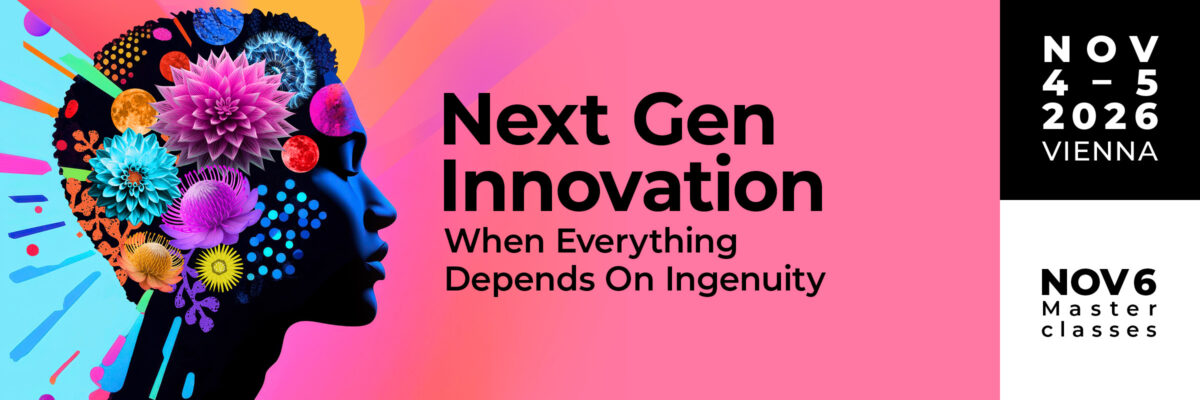
This Digital Forum is a big step on the way to our in-person Forum in November in the Vienna Hofburg. The two events share one overarching theme – performance that matters. Moving the needle on the performance of an enterprise has always been a challenge – and in today’s world it is increasingly complex. In Drucker’s day, “performance” simply meant economic performance—and Drucker himself emphasized that an enterprise must succeed in economic terms before it could devote resources to other objectives. Yet Drucker also stressed that taking on the responsibility of managing a business was a moral undertaking. Expanding profit margins, or creating more shareholder value, could not be the sole “raison d’être” given the very real impact organizations have on their customers, workers, communities, and natural environment.
Doris Drucker, our friend and mentor when we launched the Drucker Forum in 2009, told me about a comment Peter Drucker made in the last years of his life. Famous as he then was, he also knew how quickly the public memory fades. “Two years after I’m gone,” he said, “nobody will remember me.” I told Doris we would work hard to prevent that, because the world still has so much to learn from Drucker – and we especially need his wisdom now, in a time of crisis and great confusion. We try to honor his spirit by taking a broad and deep perspective on the most pressing questions of our time as they relate to management, and not hosting the kind of superficial, politicized, mainstream discussion that can be found in many places.
The backdrop to this year’s Forum is the recent sequence of crises we have experienced in the pandemic, the lockdowns, and the Ukraine war. But there have also long been other major issues smoldering under the surface: mounting debt levels, increasing fractures in our societies, worsening inequalities, diminished freedom and privacy, growing bureaucratization of our lives, and more. For years we were able to muddle through – but now we face a threat of mega-disruption. People often talk about the aftermath of a crisis as settling into a “new normal”—but this is bigger. It seems a new world order is emerging in front of our eyes: geopolitical, social, and economic. A very different world is being born – in a painful and perilous process.
Some basic assumptions are being swept away: for example, that globalization is an unalloyed good, that inflation is easy to tame, that interest rates will remain low in perpetuity, that the most efficient and robust supply chains are global ones, that mature economies are immune to food or energy insecurity, that health care will become ever more effective and accessible, that poverty is everywhere on the decline, and that conflicts will never go nuclear, to name just a few.
Drucker observed that, where there have been great gains in income and wellbeing in the world, they have derived from the improving performance of organizations and institutions – first in the west, after the industrial revolution, and in recent decades increasingly in emerging and developing countries as well. We tend to forget that these immense gains – including comprehensive education systems, universal healthcare, research institutions, social protection and mobility – were not the product of science, engineering, and research alone. It was above all the new social technology called “management” that drove the value creation at unprecedented scale that improved so many lives.
We had many good years after the Second World War, building societies that were successful by numerous measures – and, especially in the west, this led to some complacency and ideological arrogance. But as Intel’s Andy Grove observed, complacency breeds failure, and he might also see now as the moment to inject a degree of paranoia into our thinking. What we have acquired in the time after the industrial revolution is not a given: we have to defend it, again and again, and avoid major breakdowns with their catastrophic consequences for humanity.
Much of good management is about focusing on the right priorities. No longer can we treat the priorities of yesterday as the priorities of today. What we thought about energy, food, climate, efficiency, inflation, work, and management will not necessarily be the same in the future. New trade-offs may be required: economics vs social vs environmental, short term vs long term – so when famine threatens, we may need to move past fears of GMOs, for example. One of the “positive” side-effects of the mega-crisis may be that we get more real about what is really important for human life. From political leaders to managers to civil society players, all actors need to review their agenda. More of the same is not good enough. Extrapolating their narratives to the future won’t work any more, if it ever did.
This critical introspection applies to the practice of management as well. How much of 20th century management remains valid today? What classic principles of management still apply and what should change? If Drucker is still right that management’s job is to strike the right balance between continuity and change, how do we decide what stays and what goes?
JP Morgan’s Jamie Dimon recently predicted a looming economic hurricane in the wake of the consecutive Crises we experience. But he warned that we shouldn’t try to hunker down to sit out the crisis. We need to step up to the challenge. Politicians will quickly come up against the limits of bailing out anyone in need with money they don’t have. Survival, let alone progress, will be down to those who are ready to take on the challenge with their flesh, blood and brain – entrepreneurs, innovators, managers and civil servants driven by a common purpose grounded in an urgent sense of reality to build a future for the generations to come. Ideology, of whatever color, will be a bad guide to the future.
This is the energy we want to inspire at the Drucker Forum. You might ask what influence any one of us can have individually. Yet think about complexity theory and what it teaches about taking action. Famously, the flap of a butterfly’s wing can generate an air current that gathers force and eventually becomes a giant storm somewhere in the world. Let’s each start making our own moves, large and small, to change the world for the better.
I wish us all a great conference and a continuing deep and serious discussion on performance that matters – for the individual, for the team, the organization, the ecosystem and society at large.


I’m happy to see this article
thank you
This is a vital call for reevaluation across sectors! The author rightly challenges outdated practices and urges proactive adaptation, particularly in management. Their points on continuity vs. change are well-taken, especially given current economic uncertainties. Thank you for this insightful piece. Perhaps exploring agile methodologies or design thinking could offer practical solutions for navigating this “hurricane.”